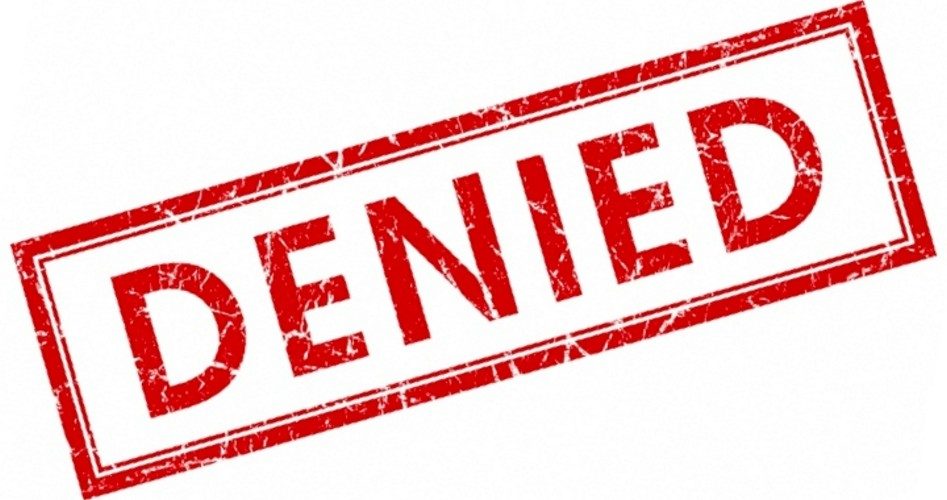
Imagine you apply for a college program, only to be denied entry because you believe in God. And the kicker is how school administrators knew about your faith.
They asked.
This is precisely what happened to Brandon Jenkins when he applied for the Radiation Therapy Program at the Community College of Baltimore County (CCBC) in Maryland. And now he’s suing in federal court for religious discrimination. Writes OneNewsNow.com:
Not long after Jenkins initially applied to CCBC’s program as a very strong candidate, he was told by a faculty member that the “field [of radiation therapy] is not the place for religion.”
But why — especially after scoring the maximum amount of points possible during his observation and meeting all the standards?
Jenkins later found that his response to a question asked by college officials during the interview process was the culprit. When asked, “What is the most important thing to you?” the Christian candidate simply replied: “My God.”
What makes this case unusual — and places the school in what should be a legally untenable position, as it receives taxpayer funding — is that program director Adrienne Dougherty actually put the discriminatory motivation in writing, expressing in an e-mail:
I understand that religion is a major part of your life and that was evident in your recommendation letters, [sic] however, this field is not the place for religion. We have many patients who come to us for treatment from many different religions and some who believe in nothing at all. If you interview in the future, you may want to leave your thoughts and beliefs out of the interview process.
Such frankness “astonished” David French, an attorney with the American Center for Law and Justice, who is representing Jenkins in his lawsuit. Fox News’ Todd Starnes reports that French told him in a telephone conversation, “While colleges routinely discriminate against Christians, rarely do they state their discrimination so explicitly.”
Critics also may ask a few questions. If the school wanted Jenkins to leave his “thoughts and beliefs out of the interview process,” why did they ask about them? Was Jenkins supposed to lie? One also could wonder, if the school learned that a person was an ardent atheist, would Dougherty mention that “we have many patients who come to us for treatment who believe in nothing at all and from many different religions,” implying it was a given that the student’s atheism precluded him from treating those outside his world view fairly? Relevant here is G.K. Chesterton’s observation, “In truth, there are only two kinds of people; those who accept dogma and know it, and those who accept dogma and don’t know it.” There isn’t an individual in the CCBC radiation program who isn’t going to have to deal with people embracing different dogma. And as Dougherty seems to prove, unjustly discriminatory motivations aren’t restricted to people of faith.
In its defense, CCBC claims that Jenkins was rejected for other reasons. Dougherty also wrote in her e-mail, reports Starnes:
that while his grades were good, there were other students with higher grade point averages.
… The college also took issue with his desire to stay in Maryland after he got his degree.
“I feel that I would be doing you a disservice if I allowed you into the program and you are not able to find a job based on your past,” she wrote.
Mr. French acknowledged that his client had a single criminal charge on his record — dating back more than 10 years.
But critics say this is only a smokescreen, as “Early in the admission process, Mr. Jenkins asked if that [the charge] would be a problem, and he was assured it would not hamper his effort,” wrote Starnes. Apparently, though, faith could.
And Christian faith isn’t just a disqualifier for students, but in some places schools as well. Just this week the Law Society of Upper Canada (LSUC), which is in Ontario, denied accreditation to Christian law school Trinity Western University (TWU) over its “community covenant,” which critics claim is discriminatory (as any standard is). The covenant states, writes LifeSiteNews.com, “that students must ‘voluntarily abstain’ from ‘sexual intimacy that violates the sacredness of marriage between a man and a woman.’ The pledge also asks that university members abstain from gossip, slander, lying, cheating, stealing, pornography, and drunkenness.” The problem? “Opponents say the policy discriminates against homosexuals and that Canada has no place for a law school that steadfastly abides by traditional Christian beliefs,” writes LifeSite. Some opponents even called the policy “abhorrent.”
But is this just an example of critics discriminating among “discriminatory” prohibitions? After all, the covenant proscribes all sexual activity outside of marriage, and its opponents said nothing about “discrimination” against fornicators and adulterers. As LifeSite also writes, “Defenders point out TWU’s policy applies to all staff and students, regardless of sexual orientation and that any student, whether gay or straight, who does not wish to abide by TWU’s code of conduct is free to attend another university. In no place of TWU’s pledge do the words ‘homosexual’ or ‘gay’ appear.”
Also this week, the Nova Scotia Barrister’s Society voted to conditionally accredit TWU — “but only if it drops the controversial policy prohibiting same-sex intimacy…,” writes The Globe and Mail.
These actions are despite the fact that Canada’s Supreme Court ruled in 2001 that TWU was within its rights to operate as a Christian school and govern itself with Christian principles; the court also stated that faith-based policies should not disqualify an institution from accreditation.
As for now, TWU is undeterred. The school is expected to challenge the two recent law society decisions in court, and its president, Bob Kuhn, “vowed to proceed with the plan to open the school in 2016 in spite of the LSUC’s decision, even as he suggested the vote ‘can’t help but have a chilling effect on the freedom with which Christians, especially evangelical Christians, feel a part of the society,’” reported The Globe and Mail.
Of course, the irony here, many critics might point out, is that most American universities — and many if not most Canadian ones — were founded as Christian institutions.

